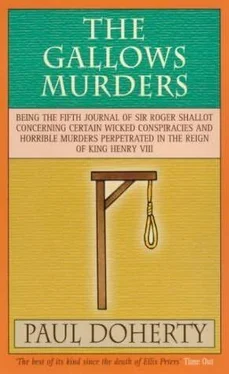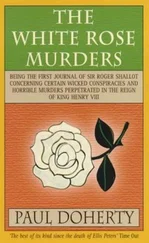Paul Doherty - The Gallows Murders
Здесь есть возможность читать онлайн «Paul Doherty - The Gallows Murders» весь текст электронной книги совершенно бесплатно (целиком полную версию без сокращений). В некоторых случаях можно слушать аудио, скачать через торрент в формате fb2 и присутствует краткое содержание. Жанр: Исторический детектив, на английском языке. Описание произведения, (предисловие) а так же отзывы посетителей доступны на портале библиотеки ЛибКат.
- Название:The Gallows Murders
- Автор:
- Жанр:
- Год:неизвестен
- ISBN:нет данных
- Рейтинг книги:4 / 5. Голосов: 1
-
Избранное:Добавить в избранное
- Отзывы:
-
Ваша оценка:
- 80
- 1
- 2
- 3
- 4
- 5
The Gallows Murders: краткое содержание, описание и аннотация
Предлагаем к чтению аннотацию, описание, краткое содержание или предисловие (зависит от того, что написал сам автор книги «The Gallows Murders»). Если вы не нашли необходимую информацию о книге — напишите в комментариях, мы постараемся отыскать её.
The Gallows Murders — читать онлайн бесплатно полную книгу (весь текст) целиком
Ниже представлен текст книги, разбитый по страницам. Система сохранения места последней прочитанной страницы, позволяет с удобством читать онлайн бесплатно книгу «The Gallows Murders», без необходимости каждый раз заново искать на чём Вы остановились. Поставьте закладку, и сможете в любой момент перейти на страницу, на которой закончили чтение.
Интервал:
Закладка:
'Oh yes,' an old tinker assured me, 'they be dropping like flies across the river. The King, the great Cardinal, and all the Court have gone to Windsor.' He lowered his voice, whispering through where his teeth had once been. The city is going to die. Satan has risen from Hell to collect his own. People say this is a curse from God. A plague sent to punish their sins.' I let the old fool prattle on. To me London was not the mouth of Hell but a veritable paradise: the streets were packed with morris dancers, hobby horses, minstrels, men in armour and trumpeters. Nevertheless, next morning when I crossed London Bridge, through the gatehouse and past the chapel of St Thomas a Becket, I noticed a difference. There were not so many carts. Nor the crowds who stand and gape on either end of the bridge at the severed heads and quartered, pickled limbs of traitors.
As I walked deeper into the city I realised the old tinker was not a fool but a prophet. Entire streets had been closed, sealed off with bars, wooden railings and chains: dark, gloomy tunnels where the refuse had not been collected but simply burnt and left to smoulder. An occasional flicker of flame showed through the heavy pall of smoke which hung there, trapped by the overhanging houses.
In Cheapside the markets and stalls were empty; not even the whores touted for business. A whining beggar on the corner of an alleyway in the Poultry told me how the rich and powerful had fled the city, following the King and Court for the fresh air of the countryside. I could scarcely believe it. I wandered back down towards the river, but the cranes and wharves were empty. The fine shops and houses of the merchants were locked and barred, their windows shuttered. So I went to the area around Newgate, always a busy place, the justices and their bailiffs forever carrying out sentence. In the Great Beast's London you could be hanged for stealing a hawk's egg, letting out a pond, or buggery (though that was rare, you had to catch them red-handed). Or for cutting a purse, as well as conjuring, sorcery, witchcraft and all those other roguish hobbies. The great yard in front of the prison doors, however, was deserted. I found the same at Smithfield. London had become an eerie city, where smoke from burning fires wafted like ghosts amongst the houses. I called into a tavern. The landlord stood far off and inspected me most carefully. 'Are you hale and well?' he asked. 'As merry-legged as you are!' I retorted.
Well, there's nothing the kitchen can offer you!' he snapped.
I told him not to be surly, and demanded a cup of wine and half a loaf of stale bread whilst I sat and plotted. Now I had left Southwark speedily, so I bartered with the landlord to stable my horses. I also hired a chamber with a heavy chest fortified by three locks to keep my possessions in. I came downstairs and walked back into the taproom. Near the window a fellow was sitting, some bardmonger cheerily humming. I ordered another cup of wine and sat and watched him: he kept mopping his face and running a finger round the neck of his shirt. The day was warm but, on close inspection, I noticed the sweat running like water down his face. The landlord, too, became alarmed.
‘You were hale and hearty when you came in,' he shouted from behind the beer-barrels, as if these great vats were a bulwark against infection.
The man got up. ‘I feel ill,' he stammered. ‘I…' He staggered a few paces, gave a groan and collapsed on the floor.
The landlord screamed and ran into the scullery, slamming the door behind him. I felt like following, but the man moaned, arching his back as if in dire agony. I walked over and knelt down beside him. His face was pallid, his clothes damp with sweat. ‘For Jesus' sake, help me!' he gasped.
Well, what could I do? I couldn't let the poor bugger die there. So, putting my hands beneath his armpits, I dragged him out into the stableyard. I swung him across my pony and made my way up the deserted streets to St Bartholomew's Hospital in Smithfield. The great market area before the abbey church was deserted. No quacks, no gingerbread stalls, no hucksters. I hammered on the door of the hospital, screaming at the top of my voice. A small postern-gate opened. An anxious-faced lay Brother popped his head out.
'Go away!' He yelled, glancing fearfully at the man whom I had lashed to the saddle.
‘For the love of Christ!' I snarled back. This is a hospital and this man is ill!'
The lay Brother sighed and, holding a vinegar-soaked cloth to his mouth and nose, stepped out. He walked over to my patient, mumbled something at me and fled back into the hospital. I went back myself: my hand brushed that of the victim. He was ice-cold. I crouched down and looked up into his face: his jaw sagged, his eyes were open.
God have mercy, the poor creature had died during that short journey from the tavern to St Bartholomew's. That was the sweating sickness, sudden and violent. I cut the body loose and lay it in the door of the church; if they didn't help the living, at least they could bury the dead! I walked back towards my tavern. It was now early afternoon. A few more people were about, but so were the death-carts. Huge, monstrous affairs, these trundled about, their drivers dressed completely in black, like shadows shot up from hell. They'd stop by a house, knock on the door, and corpses in their shifts, sometimes sewn into black canvas sheets, were thrown out like heaps of refuse. The carters, laughing and talking amongst themselves, would pick up the corpses, toss them into the cart, and trundle on. These men loved their job. They adorned themselves with black plumes and feathers and decorated their grisly carts with white-painted skeletons or the figure of death. Their bell-boys were similarly garbed: these would go in front of the carts, tolling a handbell and shouting, 'Bring out your dead! Bring out your dead!' Those houses where the infection had struck were boarded up and a great red cross daubed on them.
In some streets, looting and pillaging had begun. The riflers and cut-throats were breaking into empty houses and, with all the cheek of the devil, heaping their booty up in the carts. No one dared stop them. Oh, there were soldiers and city watchmen, but they were more frightened than helpful. They were wary of the infection and kept well away from any house bearing a red cross. The only time I saw them act was at a house just off the Shambles in Newgate. A family, fearful of an infected relative, were trying to flee, only to be forced back by the soldiers.
I returned to the tavern but the door was now closed and barred. I went round to the stableyard. My sumpter pony was standing forlornly there and, beneath the window, the iron-bound chest which contained my possessions lay smashed against the cobbles. For a while I stood and cursed, screaming at the landlord to open up. At last he replied, flinging open a window and spilling out the dirty contents of a nightjar which narrowly escaped me.
'Be gone!' he cursed. 'You're infected yourself. You'll find all your possessions there!'
I called him Satan's spawn and every other filthy name I could muster. At last, exhausted, I opened the chest. I took out my saddlebags and headed for the reeking alleyways and runnels of Whitefriars to seek out Dr Quicksilver.
I found him in his shabby tenement on the corner of Stinking Lane. He was just sitting down to sup. He greeted me as if I was the prodigal son and he the loving father.
"Roger, Roger, come and dine with me.' He took my saddlebags from my shoulder, weighing them carefully in his hands. 'More medicines, Roger, for the great Dr Mirabilis’
'It's because of Dr Mirabilis,' I snapped back, that I’m in London! The Great Mouth found me out: I need lodgings.'
Quicksilver put my saddlebags down and spread his hands. ‘Roger, this is your home. All that I have is thine.' Aye,' I replied, 'and all I have is mine!'
Читать дальшеИнтервал:
Закладка:
Похожие книги на «The Gallows Murders»
Представляем Вашему вниманию похожие книги на «The Gallows Murders» списком для выбора. Мы отобрали схожую по названию и смыслу литературу в надежде предоставить читателям больше вариантов отыскать новые, интересные, ещё непрочитанные произведения.
Обсуждение, отзывы о книге «The Gallows Murders» и просто собственные мнения читателей. Оставьте ваши комментарии, напишите, что Вы думаете о произведении, его смысле или главных героях. Укажите что конкретно понравилось, а что нет, и почему Вы так считаете.












